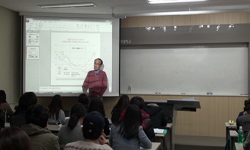Although ordinary least squares (OLS) regression analysis can be used to examine the spatial relationships between environmental equity and urban quality of life, this global method may mask the local variations in the relationships between them. Thes...
http://chineseinput.net/에서 pinyin(병음)방식으로 중국어를 변환할 수 있습니다.
변환된 중국어를 복사하여 사용하시면 됩니다.
- 中文 을 입력하시려면 zhongwen을 입력하시고 space를누르시면됩니다.
- 北京 을 입력하시려면 beijing을 입력하시고 space를 누르시면 됩니다.

환경적 형평성과 도시 삶의 질의 공간적 관계에 대한 탐색 = Exploring the Spatial Relationships between Environmental Equity and Urban Quality of Life
한글로보기https://www.riss.kr/link?id=A82668296
- 저자
- 발행기관
- 학술지명
- 권호사항
-
발행연도
2011
-
작성언어
-
- 주제어
-
KDC
500
-
등재정보
KCI등재
-
자료형태
학술저널
- 발행기관 URL
-
수록면
223-235(13쪽)
- 제공처
- 소장기관
-
0
상세조회 -
0
다운로드
부가정보
다국어 초록 (Multilingual Abstract)
Although ordinary least squares (OLS) regression analysis can be used to examine the spatial relationships between environmental equity and urban quality of life, this global method may mask the local variations in the relationships between them. These geographical variations can not be captured without using local methods. In this context, this paper explores the spatially varying relationships between environmental equity and urban quality of life across the Atlanta metropolitan area by geographically weighted regression (GWR), a local method. Environmental equity and urban quality of life were quantified with an integrated approach of GIS and remote sensing. Results show that generally, there is a negatively significant relationship between them over the Atlanta metropolitan area. The results also suggest that the relationships between environmental equity and urban quality of life vary significantly over space and the GWR (local) model is a significant improvement on the OLS (global) model for the Atlanta metropolitan area.
동일학술지(권/호) 다른 논문
-
- 한국지리정보학회
- 김형호 ( Hyung Ho Kim )
- 2011
- KCI등재
-
항공 라이다 자료를 이용한 토석류 발생지역의 지형복원기법 개발
- 한국지리정보학회
- 우충식 ( Choong Shik Woo )
- 2011
- KCI등재
-
- 한국지리정보학회
- 조형경 ( Hyung Kyung Joh )
- 2011
- KCI등재
-
홍수위험지도 활용을 위한 낙동강 유역에서의 홍수취약도 분석
- 한국지리정보학회
- 김태형 ( Tae Hyung Kim )
- 2011
- KCI등재




 ScienceON
ScienceON KISS
KISS







